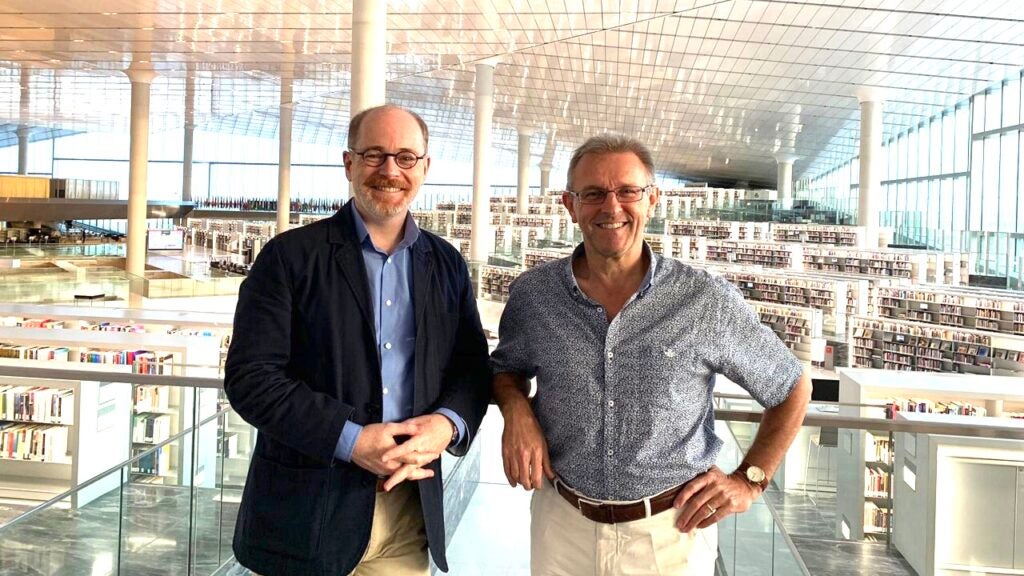Journal of Arabian Studies Article Highlights Role of Partners GU-Q and QF in the Development of the Field of Gulf Studies

Photo of James Onley (L) and Gerd Nonneman (R) at Qatar National Library, taken prior to the COVID-19 pandemic
Qatar-based research and institutional support has played a prominent role in the global development of the field of Gulf and Arabian Peninsula studies in recent years, finds an article published by scholars at Georgetown University in Qatar (GU-Q) and Qatar National Library (QNL), Qatar Foundation partner institutions. Their article appears in the 10th anniversary issue of the top journal in the field, the Journal of Arabian Studies (published by Routledge), and offers the first-ever comprehensive survey of the global development of this field, including within the region itself, charting its scholarly societies, centers, projects, graduate programs, publications, and conference series since the mid-19th century. The authors show that the field of Gulf studies has experienced a meteoric rise, especially in the last decade.
Dr. Gerd Nonneman, Professor and former Dean of GU-Q, and Dr. James Onley, Director of Historical Research and Partnerships at QNL, co-authored the article, and serve as Editors of this double-blind peer-reviewed international scholarly journal. It is indexed by the Scopus scientific abstract and citation database, and accepts article submissions on the Arabian Peninsula, its surrounding waters, and their connections with the western Indian Ocean (from West India to East Africa), from antiquity to the present day.
Central to the development of the field in recent years has been investment in educational institutions in the Middle East which helped provide a base for researchers, and enhanced access to the historical documents upon which research in the humanities and social sciences depend. According to the findings, GU-Q, Qatar National Library –– as well as the Gulf Development Forum (founded by the Qatari scholar, Ali Khalifa Al-Kuwari), Qatar University, the Arab Center for Research and Policy Studies at the Doha Institute, and the Hassan Bin Mohammed Center for Historical Studies –– played significant roles in the development of the field, and in increasing the amount of research on Qatar.
Qatar’s investment in preserving its history, and providing resources for research began with the Amiri Diwan’s Documents and Research Department in 1974, the National Museum in 1975, the Gulf Development Forum in 1979, the Arab Gulf States Folklore Centre in 1983, and the Hassan Bin Mohammed Center for Historical Studies in 1997, but Qatar’s first academic research center in the field was not established until 2007 by Qatar Foundation partner GU-Q. The university’s Center for International and Regional Studies (CIRS) soon became “the leading social science hub in the region for the study of the modern Gulf, conducting its own research as well as acting as a catalyst for researchers from the region and across the world.”
QNL’s contribution, through the Qatar Digital Library launched in 2014, has been to place over two million pages of historical material on the Gulf and Arabian Peninsula online for the world to access, including the British Library’s important Gulf collection. This has resulted in a major increase in the number of scholarly publications in the humanities and social sciences focused on the region, Qatar in particular. Dr. Onley explains that “The QDL is changing the way scholars and students research the history of the Gulf region. It has become their first port of call, enabling them to find in seconds what used to take them weeks, months, or even years. It is making the past more accessible than ever, leading to a sharp increase in the number of exciting new historical studies on the Gulf –– the least-studied region in the Middle East.”
Dr. Nonneman notes the history of the Journal of Arabian Studies began at the University of Cambridge in 1974 as Arabian Studies (a humanities journal), and then moved to the University of Exeter as New Arabian Studies in 1994, where it was published by the Centre for Gulf Studies until 2004. “When James and I re-launched the journal at Exeter in 2011, just before I moved to Doha, we expanded the scope beyond the humanities to include contemporary topics and social science research,” he said, adding: “I am particularly pleased at the increasing number of authors from Qatar and the Gulf itself whose research we have been able to publish.” From 2011, the journal has been published in association with GU-Q, and it is supported by the Association for Gulf and Arabian Peninsula Studies, a global scholarly network of researchers and students of the region, also established in 2011.
The article notes other major developments in the field, including the establishment of Qatar University’s Gulf Studies Program (2011) and Center (2013), with the first MA and Ph.D. in Gulf studies in the MENA region, as well as the launch of the annual Gulf Studies Forum by the Center for Research and Policy Studies at the Doha Institute. It also surveys several major research projects on the history of Qatar performed by Msheireb Museums, UCL-Qatar, and Qatar National Library, all funded by Qatar Foundation. Qatar’s large community of Gulf Studies scholars –– the largest of any city in the world –– has played an important role in the expansion of the field. Qatar University’s Gulf Studies Program has produced numerous theses and papers on the region, as well as a new book series launched last year.
The number of books and journal articles in the field are rapidly increasing. Among them are two recent books that emerged out of special issues of the Journal of Arabian Studies: Art and Cultural Production in the GCC (Routledge, 2018) edited by GU-Q’s Suzi Mirgani and The “Resource Curse” in the Persian Gulf (Routledge, 2020) edited by former CIRS director Mehran Kamrava, with more such publications to come in the future.
These contributions confirm what the newly published Journal of Arabian Studies article illustrates: Qatar has become a central hub of knowledge production about the Gulf and the Arabian Peninsula over the past decade.